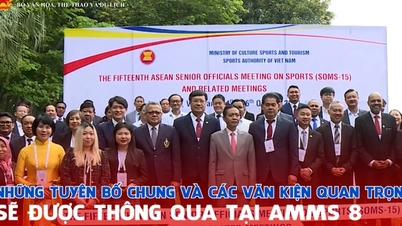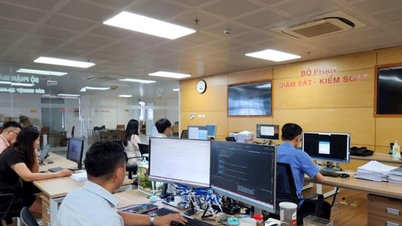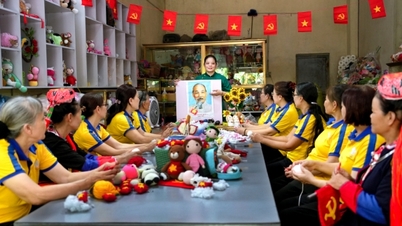Spending Trap: Invisible Pressure and End-of-Month Shock
Commenting on the above reality, Mr. Nguyen Viet Thang, Deputy Director of Retail Banking, Vietcombank Digital Technology (VCBNeo), said that when they have just left high school, live away from home for the first time and have autonomy in spending, many new students are easily caught up in excitement: shopping, gathering with friends, experiencing new things...
However, when you do not know how to balance, money quickly runs out, you easily fall into a situation where at the end of the month you have to live frugally, worry or borrow. This situation not only causes short-term pressure but also has the potential to form undisciplined spending habits, affecting the future.

Mr. Nguyen Viet Thang believes that not managing spending will cause short-term pressure, potentially leading to the formation of undisciplined spending habits (Photo: NVCC).
Sharing the same view, Ms. Trinh Thu Thuy, Director of an educational consulting company in Ho Chi Minh City, said that this is a remarkable and cyclical reality in student life. This clearly reflects the lack of experience and social psychology of this age group.
According to Ms. Thuy, for new students, the first stage of enrollment has many unforeseen expenses.
Some typical expenses for initial necessities are: Buying personal items, paying rent, buying textbooks or purchasing technology devices (personal computers, phones). These expenses often cause the first "shocks" of spending.
On the other hand, with the feeling of "escapism" and freedom when first given full control over money, many people tend to spend according to their preferences and emotions instead of according to a plan.
Emotional spending is also reflected in shopping to relieve stress, or to keep up with peer pressure. Along with that, most students do not keep statistics on how much money they spend, only estimating without keeping detailed records.
“The core reason is that young people lack basic knowledge. Many students have no concept of budgeting, emergency funds or income allocation principles. They simply spend money when they have it and stop when it runs out,” Ms. Thuy said.

Many students are in a "broke pocket" situation because they don't know how to save money (Photo: Tuyet Luu).
Choose technology and practice discipline
To avoid panic at the end of the month, experts say students need to practice financial management habits from the beginning.
Proposing specific solutions, Mr. Nguyen Viet Thang suggested some methods and support tools such as expense management applications, envelope methods or simply keeping a notebook.
According to Mr. Thang, for students who regularly use their phones, they can use spending management applications with visual charts to help track and remind them of their limits.
Another way is to apply the envelope method combined with the 50/30/20 rule: 50% for essential needs (food, accommodation, transportation...), 30% for desires (entertainment, coffee, shopping...) and 20% for savings/reserves.
This method requires dividing money into separate envelopes by week or by need group, and when the money runs out in a category, stop spending in that category. In addition, students should record basic expenses in a notebook for easy tracking.
Students should also pay attention to the principle of saving first and spending later. As soon as you receive money from your family or part-time job, set aside a fixed amount of money, savings/reserve money first. Only spend the rest. This also forms a sustainable saving habit.
Another method is to practice the "1-day thinking" principle. For any item worth more than 100,000 VND, postpone the purchase decision until the next day to limit impulse spending.
The Vice President emphasized that financial discipline is more important than tools, because although spending management applications are useful, they are not "omnipotent" and not suitable for everyone. The tools are only supportive, reasonable spending depends on each student's habits and self-discipline.
“The most important thing is awareness. Learn to say “no” to entertainment beyond your means and understand that independence is not only about studying but also about finances. By practicing spending discipline today, students will have a more solid foundation for the future,” Mr. Nguyen Viet Thang advised.
In addition, Ms. Trinh Thu Thuy emphasized the need to control expenses. She said that when setting a fixed monthly amount for personal needs, students must accept to stop gatherings when they run out of money or look for free forms of entertainment such as walking, reading in the park, or studying in groups at the library.

Ms. Trinh Thu Thuy believes that students need to learn how to invest in experiences, not material things, for long-term benefits (Photo: NVCC).
Additionally, students can learn to shop smart. Wait for sales or promotions to buy things for themselves.
On the other hand, according to Ms. Thuy, students need to focus on investing in experiences instead of material things. Limit spending too much money on clothes and milk tea every day, prioritize spending on short-term skill courses, foreign language certificates or volunteer trips to help expand knowledge and network of relationships. These are investments that bring long-term benefits to your career.
Two experts said that financial management in college not only helps students avoid panic at the end of the month because they run out of money, but also provides an opportunity for students to practice responsible thinking and planning skills, which are crucial skills for their future lives.
Source: https://dantri.com.vn/giao-duc/dau-thang-an-sang-cuoi-thang-hoang-mang-loi-khuyen-vang-cho-sinh-vien-20251002082018101.htm


![[Photo] General Secretary To Lam visits Kieng Sang Kindergarten and the classroom named after Uncle Ho](https://vphoto.vietnam.vn/thumb/1200x675/vietnam/resource/IMAGE/2025/10/09/1760023999336_vna-potal-tong-bi-thu-to-lam-tham-truong-mau-giao-kieng-sang-va-lop-hoc-mang-ten-bac-ho-8328675-277-jpg.webp)


![[Photo] President Luong Cuong attends the 80th Anniversary of the Traditional Day of Vietnamese Lawyers](https://vphoto.vietnam.vn/thumb/1200x675/vietnam/resource/IMAGE/2025/10/09/1760026998213_ndo_br_1-jpg.webp)
















![[Video] Hanoi exempts tuition fees for public school students from the 2025-2026 school year](https://vphoto.vietnam.vn/thumb/402x226/vietnam/resource/IMAGE/2025/10/10/1760056416944_dung00-42-47-20still009-jpg.webp)






































![[VIDEO] AI version of BSR General Director Nguyen Viet Thang: From the mission of energy shield to the desire to contribute](https://vphoto.vietnam.vn/thumb/402x226/vietnam/resource/IMAGE/2025/10/10/1760062415027_0000371c-f2a1-31a0-38a9-e3de0ece2bbd.jpeg)












































Comment (0)